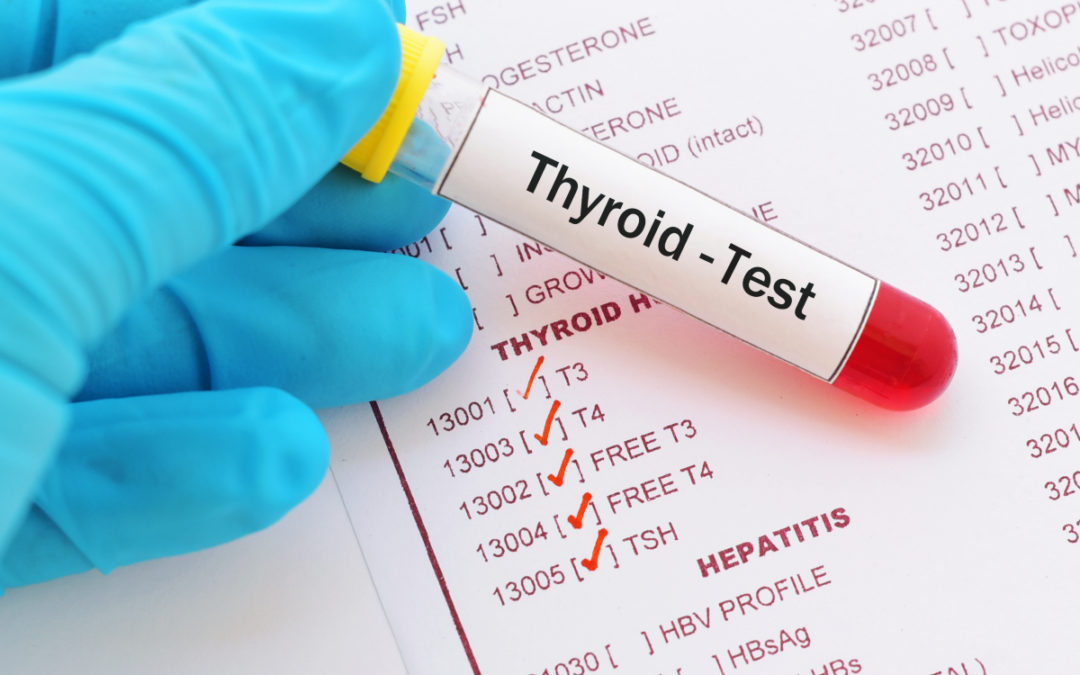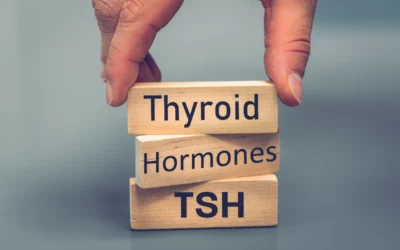The thyroid is a small butterfly-shaped gland in the neck that plays a key role in helping the metabolism work properly. A thyroid blood test assesses the levels of thyroid hormone and antibodies and provides a valuable insight into the balance of hormones. Find out why a thorough understanding of these key indicators is an important step in maintaining optimal thyroid health, while also helping to detect potential problems such as hypothyroidism or even signs of cancer.
What is a thyroid blood test?
To assess the thyroid, a blood test is carried out to measure levels of key thyroid hormones: i.e. thyroxine (T4), triiodothyronine (T3) and thyroid stimulating hormone (TSH) secreted by the pituitary gland.
These indicators play a crucial role in regulating the metabolism, and in growth and development. This blood test also provides information on the balance of hormones, to allow doctors to identify any problems linked to conditions such as hypothyroidism, hyperthyroidism, nodules or even symptoms indicative of thyroid cancer.
What are the different types of thyroid blood tests?
These lab tests help practitioners to diagnose thyroid problems accurately, thus enabling them to provide appropriate and personalised care.
TSH test
TSH is a hormone secreted by the pituitary gland that acts as a key regulator of thyroid activity. A high level can indicate hypothyroidism, suggesting an underactive thyroid, while a low level may indicate hyperthyroidism, reflecting an overactive thyroid.
TSH levels generally range between 0.4 and 4 mIU/L and may vary throughout the day. Fluctuations can occur without necessarily indicating a dysfunction. However, if the TSH level drops below or falls outside these “normal” ranges, a second test is recommended a few weeks later to confirm the absence of associated disease.
Free triiodothyronine (free T3)
The free T3 test evaluates the amount of T3 hormone available to cells. A high level of free T3 may be associated with hyperthyroidism, while a low level of free T3 may indicate hypothyroidism. Normal levels of free T3 range from 1.07 and 3.37 nmol/L, with levels decreasing with age.
Free thyroxine (free T4)
High levels of free T4 may be linked to hyperthyroidism or iodine overload, while low levels may suggest hypothyroidism. The interpretation of results often requires correlation with other tests to obtain a complete picture. Free T4 levels should range between 12 and 23 pmol/ml or 9.4 to 18 pg/ml.
Antithyroid antibodies
Anti-thyroid antibodies, such as thyroid peroxidase (TPO) and thyroglobulin (TG) antibodies, are measured to detect any immune responses to the thyroid. High levels can indicate auto-immune disorders such as Hashimoto’s disease.
It is essential to interpret these results in order to diagnose and treat auto-immune thyroid disorders. In adults, a normal level of anti-TPO antibodies is less than 35 IU/ml.
What happens during a thyroid profile?
The first step is a blood test that has been medical prescribed in connection to symptoms, previous results or preventive therapeutic monitoring. The test is performed in a medical lab where a small sample of blood (generally from a vein in your arm) is collected.
This blood is used to measure concentrations of hormones, TSH and antithyroid antibodies. The doctor examines the results (generally available after a few days) in relation to reference values.
Levels that are too low or too high compared to the reference values may indicate abnormalities, but only a medical consultation can provide an accurate interpretation. The doctor will discuss with the patient the results, findings, possible implications and treatment options, if applicable. Follow-up tests or other investigations may be recommended to further narrow down the diagnosis.
What is a full thyroid blood profile and when is it recommended?
A full thyroid blood test is an in-depth profile that provides a comprehensive assessment of thyroid function. It generally includes standard tests such as TSH (thyroid stimulating hormone) and free T4 (free thyroxine) or free T3 (free triiodothyronine). Alternatively, the thyroid profile can be carried in a cascade: TSH test first, followed by T4 and T3 tests if the TSH level is abnormal.
However, a full profile is even more comprehensive and includes other markers such as antithyroid antibodies, total T3, total T4 and thyroglobulin.
This type of profile is recommended in various situations.
- Firstly, if the symptoms are suggestive of dysfunction including fatigue, unexplained weight loss or gain, sleep disorders or mood changes.
It can also be prescribed:
- if family history of thyroid deficiency,
- if pregnancy (always performed before any assisted reproduction, recommended before and then during pregnancy for any woman with thyroid disorders),
- for treatment monitoring,
- if suspected nodule or cancer,
- as part of an overall medical assessment.
Good to know:
A thyroid nodule is a common condition. According to the French National Authority for Health (HAS), this condition mainly affects women, and its frequency can increase with age. In 90% of cases, the painless lump is benign.
Did you know?
The FLUOBEAM® LX device is a major technological advance in thyroid surgery. This dedicated imaging system for thyroid surgery optimises control of post-surgical complications by helping to preserve the parathyroid glands, thereby reducing thyroid problems. In short, FLUOBEAM® LX represents a key advance, offering extra help during thyroid surgery.
In conclusion, an in-depth analysis of the key indicators of the thyroid blood test provides an insight into the condition of the gland. The determination of TSH, T3, T4 levels and anti-thyroid antibodies by a doctor not only allows any hormonal imbalances to be diagnosed, but also provides guidance for personalised treatment approaches. This highlights the importance of a thorough interpretation of results, especially in terms of the early detection of nodules, hypothyroidism or suspicious symptoms suggestive of potential thyroid cancer.




